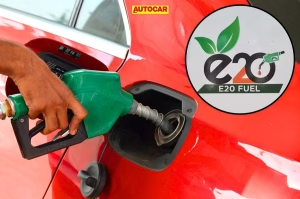GS3 – Environment and Energy Security

Context
- The Automotive Research Association of India (ARAI) confirmed that E20 fuel (20% ethanol + 80% petrol blend) is safe for use across all vehicles currently running on Indian roads.
- The clarification comes amid concerns over engine damage, mileage reduction, warranties, and insurance coverage.
Key Highlights
ARAI Findings
- A 2021 ARAI study (submitted to authorities, not public yet) tested two-wheelers and cars from 2–3 major OEMs over 1 lakh km.
- No breakdowns or negative impact on non-E20 vehicles were observed.
- E20 fuel is safe for all vintages of vehicles in India.
Vehicle Performance & Mileage
- Concerns of large mileage drops (20–50%) were dismissed as misinformation.
- Ethanol has 30–35% lower calorific value, but when blended at 20%, it results in maximum 6% loss in energy output.
- Real-world testing showed only 2–4% efficiency loss, depending on vehicle condition and usage.
Insurance & Warranty Concerns
- Society of Indian Automobile Manufacturers (SIAM) confirmed:
- Car warranties and insurance remain valid, irrespective of the fuel type used.
- OEMs are informing customers through official communication.
Cost Implications
- No increase in vehicle prices to make them E20-compliant.
- Toyota Kirloskar Motors clarified that since April 1, 2023, all new vehicles sold in India are E20-certified after fine-tuning and emission testing.
Significance
- Supports India’s ethanol blending programme (target: 20% blending by 2025).
- Reduces dependence on crude oil imports, improves energy security, and supports farmers (ethanol from sugarcane, maize, etc.).
- Aims at lowering carbon emissions from transport sector.
- Builds consumer confidence by ensuring safety, performance, and cost-neutrality.




